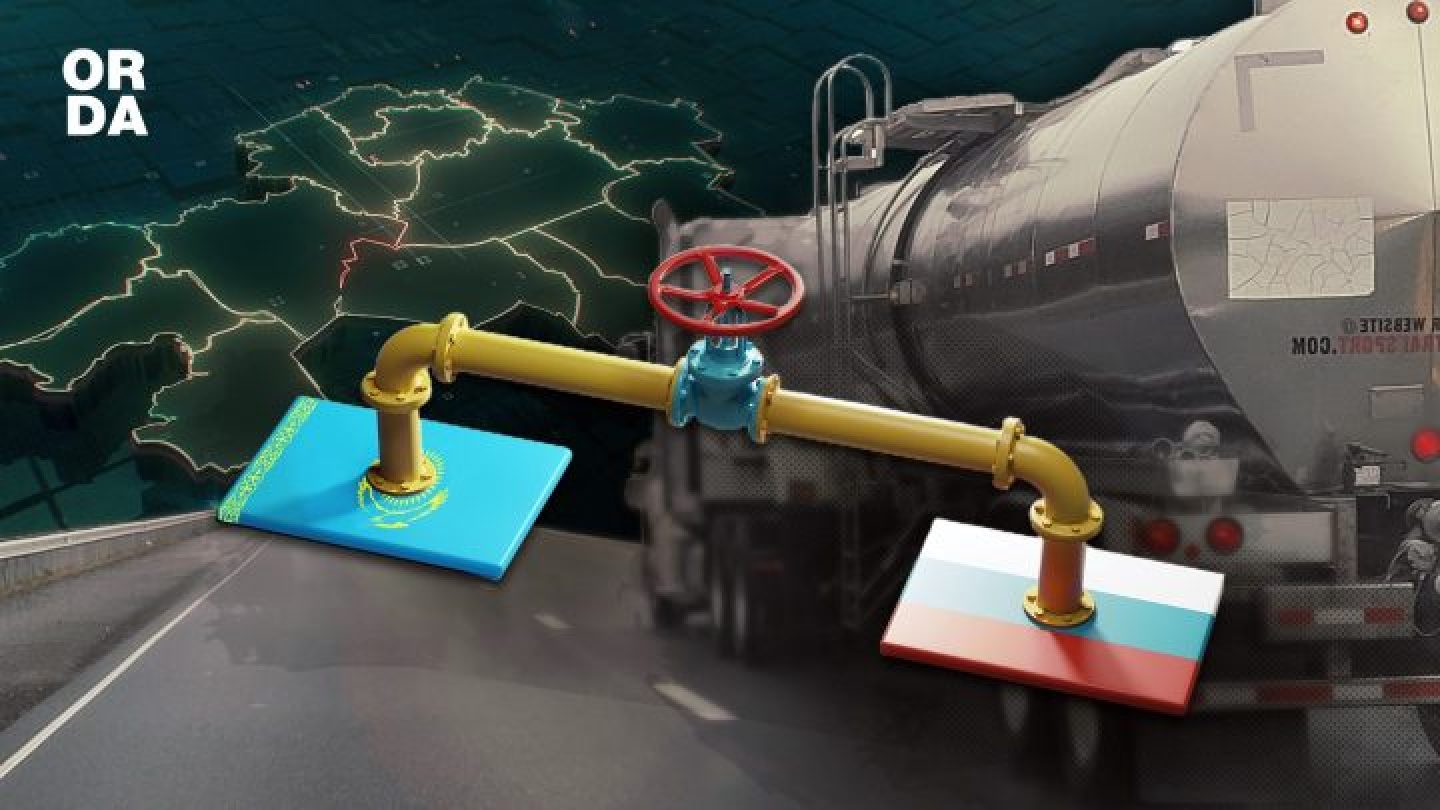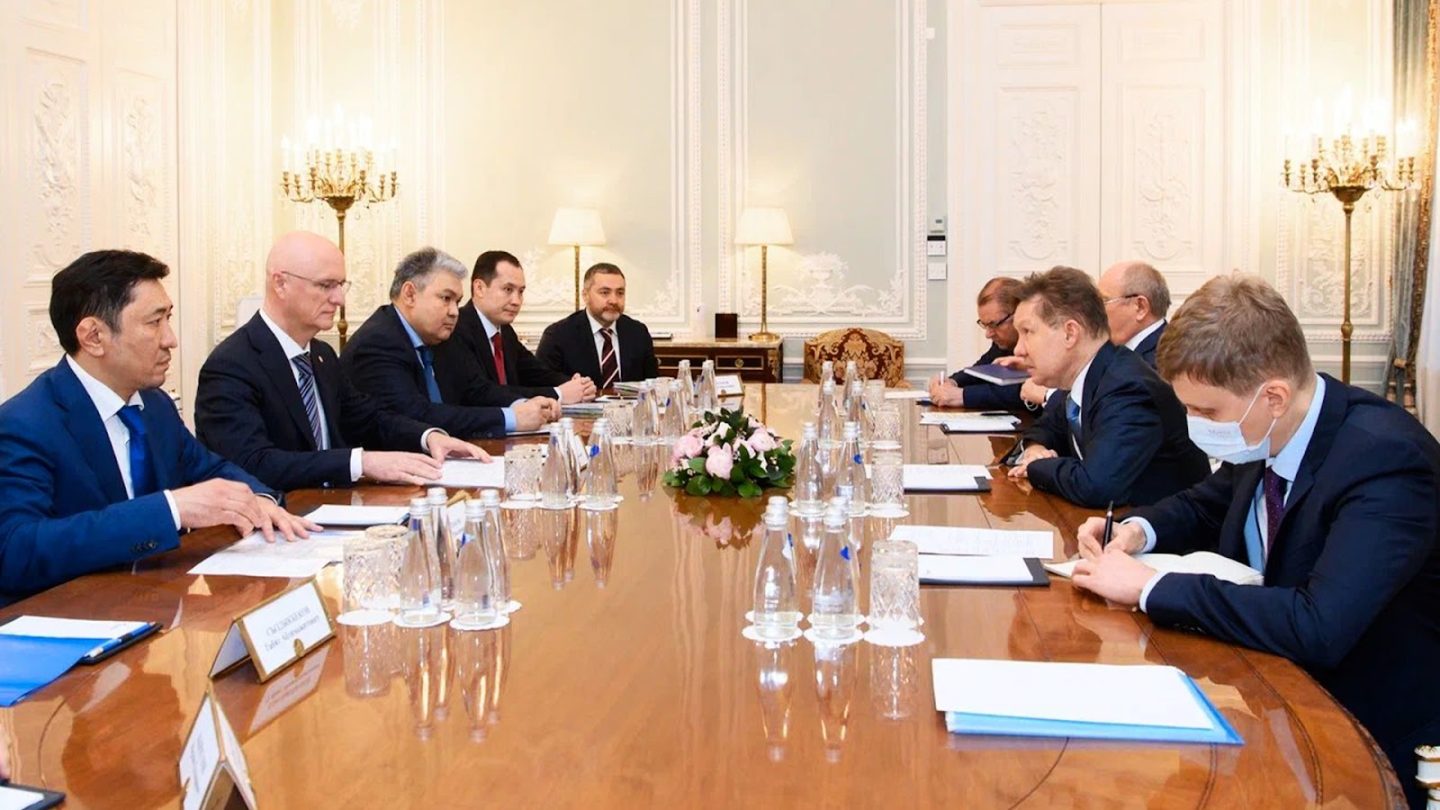Russian Gas to Kazakhstan: Who Benefits from It?

First Deputy Prime Minister Roman Sklyar recently visited St. Petersburg. There he met with the head of Gazprom. They discussed, among other things, the processing of Kazakhstani gas at the Orenburg Gas Processing Plant. The most peculiar aspect, however, is the possible supply of Russian gas to Kazakhstan. This is especially true considering the sanction pressure on Astana's northern neighbour. A roadmap was signed, but the government did not give any explanations aside from a dry press release. Orda.kz turned to experts in the oil and gas sector for commentary.
Ambassador to Russia Yermek Kosherbayev, Energy Minister, Bolat Akchulakov, and Chairman of the Board of QazaqGaz, Sanzhar Zharkeshov, also attended the meeting on January 18 in St. Petersburg.

Nurlan Zhumagulov
Director of the public fund Energy Monitor, Nurlan Zhumagulov, said that it is necessary to wait for the government's explanations regarding the contract. He believes that the government will make a statement in the near future.

"I think it's about the price of the issue. If they agree on a good internal price, it will be wonderful. Because our gas price is lower than in Russia. And if they also lock this contract in as a long-term commitment, then it will all the better. High prices are not profitable for us."
Artur Shahnazaryan
Oil and gas industry expert Artur Shakhnazaryan explained the situation with Russian gas supplies from the point of view of Kazakhstan, Russia and Uzbekistan. He also shared insider.
"According to informed sources, we are talking more about creating a trilateral gas consortium, where Gazprom's daughter will act as a single operator. The achievement of any initial agreements on the basic principles is still speculative."
According to the analyst for the Caspian region, there is cheap coal in Kazakhstan, so the country does not have such an acute problem. But the population still prefers gas, not coal.
"We have two gas pipelines from the Soviet period. One gas main with Turkmenistan through the territory of Western Kazakhstan, Central Asia and the Centre with a capacity of 50 billion cubic meters per year. The second is the Bukhara–Ural gas pipeline with a capacity of 8 billion cubic meters per year. Thus, we automatically act as intermediaries between Russia and Uzbekistan. Because of this, we can soften the price of gas for ourselves, using our transit advantage. Like any participant in such transactions, we need cheaper gas."
According to the expert, the Russian side will also benefit from the contract.
"Russia has a lot of gas. Even before the war, they sold only two-thirds of their stocks. And under the conditions of sanctions, [Ed. our] northern neighbor is reorienting to the Asian market. Russia, by reversing the gas pipeline, is obliged to have guarantees of stable supplies. The insinuation that they demand that all gas assets be transferred to Gazprom's ownership is most likely political. It is no secret that in the conditions of the war in Ukraine, any new market for Russian gas will meet opposition in the West and attempts to prevent the implementation of plans."
Artur Shahnazaryan believes that the gas situation in Uzbekistan is much more complicated. In reality, Tashkent's reserves of blue fuel are 40 times less than it is believed.
"Uzbekistan was once a source of gas resources. It is believed that they have a lot of reserves – 2 trillion cubic meters of gas. But good times end sooner or later. In the future, the gas shortage in Uzbekistan will increase due to the growth of demand against the background of depletion of its own fields. Citizens react quite sensitively to gas shortages and blackouts. Therefore, this is the number one problem for official Tashkent. Uzbekistan would prefer more Turkmen gas, but it is already occupied and secured by China and Iran. As a result, Russian gas supplies with transit through Kazakhstan can help solve the problem. The infrastructure for them already exists. We are talking about the Central Asia–Centre main gas pipeline. At one time, gas from Turkmenistan through Uzbekistan and Kazakhstan went through it to the central regions of Russia. Now this gas pipeline could provide reverse supplies to Uzbekistan."
The expert noted that it is too early to draw conclusions. The project is in its infancy. All these factors are nonetheless pushing states to develop some kind of unified scheme of interaction.
"The countries need to agree on volumes, on the price formula, on ownership and payment schedule. Moreover, Kazakhstan and Uzbekistan can still find new gas reserves at home. For example, if blue fuel was found in Uzbekistan at a depth of three thousand meters, then it can be found at a depth of six thousand meters. There are gas prospects in the east of Kazakhstan. Therefore, both countries will always keep in mind that the situation may change at any moment."
Artur Shahnazaryan also noted China's interest in the gas union. The chairman of the Board of Uztransgaz, Behzon Narmatov, announced a reduction in exports to China last month. The reason for this was the increase in the consumption of blue fuel in winter. This is despite the fact that the volume of deliveries in 2022 has already decreased three times compared to 2021. Uzbekistan is also set to completely abandon the sale of gas abroad in 2025.
China is thereby even more interested in Kazakhstan's gas. In November 2022, Premier of the State Council of the People's Republic of China Li Keqiang expressed hope to Prime Minister Alikhan Smailov that Kazakhstan would ensure stable gas supplies and maximize them in winter.
"Three parallel lines of the Central Asia–China main gas pipeline with a total capacity of 50 billion cubic meters per year (35-40 billion cubic meters per year is provided by Turkmenistan) pass to China from Turkmenistan through the territories of Uzbekistan and Kazakhstan. Turkmenistan and China are currently discussing the construction of a fourth line with a capacity of 30 billion cubic meters per year. It will pass through Uzbekistan, Tajikistan and Kyrgyzstan. During the negotiations, the volume of Uzbekistan's gas supplies through this pipeline is being discussed."
Kazakhstan, Russia and Uzbekistan should resolve the gas issue by 2025. By this time, all parties are obliged to come to the implementation of the project. Artur Shahnazaryan added that the scale of the project is not big enough to attach a global and geopolitical nature to it.
Olzhas Baidildinov
Ex-adviser to the Minister of Energy, host of the author's program "Baidildinov. Oil" Olzhas Baidildinov believes that a gas union with Russia is necessary. The reason is the shortage of natural gas, which the countries of Central Asia have faced.

"As far as I understand, we are talking about the reverse of the Central Asia – Centre gas pipeline, built back in Soviet times, as well as the construction of a new infrastructure for gas supplies to the north of Kazakhstan. Due to price restraint, a shortage of natural gas has been recorded in our country for several years. The national company QazaqGaz may become bankrupt in the next two years due to the unprofitability of the domestic market. Annually, due to internal prices, the company loses up to 100 billion tenge. The total losses have already exceeded $1.5 billion!
There is no gas. At the same time, we have obligations to supply it to China. We have signed an agreement with Turkmenistan on the import of 1.5 billion cubic meters of gas. But no one has announced the exact price of these supplies. The freeing up of Russian gas due to the special military operation and sanction story are a great chance for Kazakhstan to solve problems with gasification and even receive income from the transit of natural gas to Uzbekistan, which also faced a shortage of it."
Olzhas Baidildinov added that Russian gas supplies will not be in the same price range as Kazakhstan's. The expert believes that Kazakhstan's prices for natural gas should increase three times so that the gas sector ceases to be unprofitable.
What About Liquefied Gas?
One of the main reasons for the Bloody January events was the increase in gas prices. Qasym-Jomart Toqayev fixed the price of fuel for six months after the unrest. Later, the moratorium was extended until the end of 2022. And on January 11, 2023, the Minister of Energy changed the list of petroleum products with state regulation of prices.
This decision provoked a shortage of fuel on the ground. Almaty gas stations can refuse to provide service for various reasons. The akim of the Kyzylorda region, Nurlybek Nalibayev, has also ordered the installation of roadblocks to combat the illegal export of gas.
This is all against the background of the Pavlodar refinery's statement about overstocking liquefied gas due to the untimely export of goods by gas grid organizations. Unfortunately, this may also affect the reduction in the production of gasoline and diesel fuel.
Original Author: Maria Gorbokonenko
DISCLAIMER: This piece is a translation. The text has been modified, the content is the same. Please refer to the original article in Russian for accuracy.
Latest news
- Daulet Bekmanov Heads NIT Following Reported Data Leak
- Grave of Noble Nomadic Warrior Unearthed in Turkistan Region
- Kazakhstan Suspends Karachaganak Gas Plant Project With Foreign Partners
- Toqayev Opens CICA Headquarters, Highlights Importance of Diplomacy Amid Global Tensions
- Chinese Company Sinopec Launches 4.7 Billion Tenge Oil Drilling Project in Mangystau
- Ukraine's MoD Claims No Official Notice Received from U.S. on Munitions Suspension
- Azerbaijani Ministry of Science and Education Urges Caution Over Claims of Ending Russian-Language Education
- Alexander Lukashenko Pardons 16 People, Including Those Convicted of “Extremism”
- U.S. Reportedly Floated Corridor Deal via Armenia — Carnegie Report
- Orda.kz talks with Expert on Recent Escalations between Moscow and Baku
- Court Reviews Corruption Case Involving Samruq-Qazyna Subsidiary in Atyrau
- Claims Surface that Azerbaijan Plans to Close Russian-Language Schools
- Publishing House with Bomb Shelter Privatized in Almaty Returned to State Ownership
- 5,000 Dombra Players Set National Record in Taldykorgan
- A Piece of the Shoreline Pie: How Sarsenov Lost His Aqtau Land and Kulibayev’s Role
- Armenian Parliament Makes Initial Moves to Nationalize Electric Networks of Armenia
- Toqayev Orders Tighter Migration Control, Calls for Unified Digital Systems
- Kazakhstan: Forecasters Warn of Heavy Rains in the North, Scorching Heat in the South
- Who Writes the Rules? Trump’s Former Associate Discusses Kazakhstan’s Current Position with Orda.kz
- Omsk Governor Proposes Boosting Trade with Kazakhstan via Irtysh River

